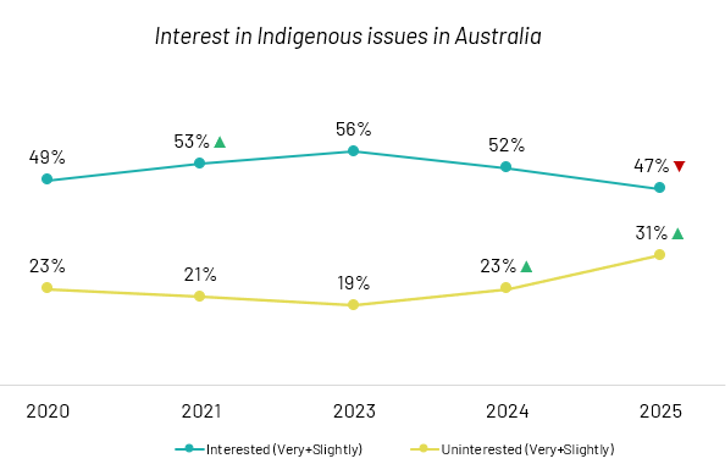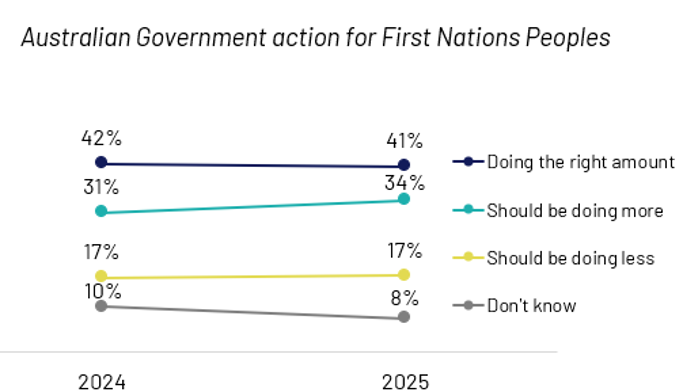Reconciliation efforts face headwinds as symbolic gestures lose favour
Reconciliation efforts in Australia are facing significant headwinds, with symbolic gestures losing favour among the public, according to the latest Ipsos Indigenous Issues 2025 report.
The report measures Australians' perceptions of First Nations issues, including Indigenous recognition and the role of Government in acting for First Nations peoples, and has been tracking these issues since 2021.
The survey was conducted in late April 2025 and found Australians' interest in Indigenous issues has declined to its lowest level since 2021, with many showing decreased support for reconciliation initiatives. There is also a downward trend in the perceived importance of Treaty and Voice to Parliament as ways forward for reconciliation. However, young Australians continue to show stronger engagement with Indigenous issues compared to older generations.
Key findings:
- Interest in Indigenous issues has declined: Only 47% of Australians said they were interested in Indigenous issues, down from the peak of 56% in 2023 during the Voice to Parliament Referendum.

- Government action is desired: Despite declining interest, one in three Australians (34%) believe the government should be doing more for First Nations people, rising to 45% among 18-29 year olds.

- "Modern racism" and the illusion of shared opinion: The persistence of attitudes associated with "modern racism" remains a significant obstacle. These beliefs not only fuel resistance to initiatives supporting First Nations people but also create a distorted perception of how widely shared these opinions are.
- Symbolic gestures losing favour: While support remains strong for initiatives that focus on education and historical understanding, there is a decline in support for Acknowledgements of Country (44% in 2024 to 39% in 2025) and use of traditional place names (38% in 2024 to 35% in 2025). This reflects growing scepticism towards symbolic gestures and a need to focus on tangible actions and policies that deliver real benefits to First Nations communities.
- Changing Australia Day still unpopular: 46% of Australians disagree with changing the date of Australia Day, with 23% agreeing (31% hold neutral or moderate views) Support for change is higher among young people (35% of 18-29 year olds agree the date of Australia Day should be changed).
- Generational divide: Younger Australians consistently show more interest in and support for Indigenous issues compared to older generations.
Ipsos Australia Public Affairs Research Director, Nonie Finlayson, said: "The Indigenous Issues report comes amid ongoing turbulence in Australian Indigenous affairs following the 2023 Voice to Parliament Referendum. Many Australians appear to be experiencing fatigue around Indigenous issues, with interest and support for key initiatives declining.
"However, the strong engagement of younger generations offers hope for the future of reconciliation efforts. Their higher levels of interest, cultural sensitivity and support for government action suggest focusing on youth engagement could help reinvigorate the reconciliation agenda. There is a desire for building meaningful connections between Indigenous and non-Indigenous Australians, focusing on tangible actions and policies, with less support for initiatives that are seen to be symbolic.”


